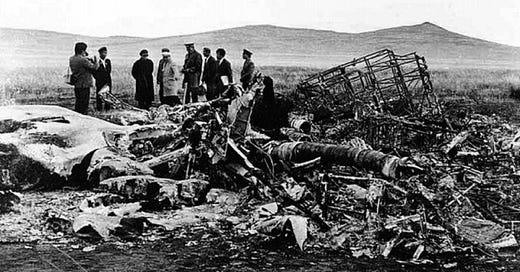Prigozhin's Demise, Putin's Gain ?
Power struggles tend to bring longer term leadership changes
My very first thought when the news of Yevgeniy Prigozhin’s death hit the wires last week was about Lin Biao who was Mao’s number two and armed forces leader up until September 1971 when his plane crashed under mysterious circumstances. The official line was that Lin attempted a coup and after it had failed he and his family boarded an aircraft that subsequently crashed over Mongolia killing all passengers. Sounds familiar, no?
Like Lin’s case we will never know exactly what happened on the day Prigozhin’s plane came down, but it was always quite clear that the man and some of his friends were living on borrowed time. Putin at some point would have to re-establish his authority, and punish those responsible for the ‘coup attempt’ from Prigozhin earlier this summer. No authoritarian leader can be unchallenged, in particular not by someone who enjoys solid support and happens to control a significant armed operation. If you are part of Putin’s coterie, you play the game and obey the boss and if you are in doubt just refer to any Mafia movie in order to understand how raw power is exercised. Multiple Russian oligarchs have been poisoned or suddenly dropped from hotel rooms ever since the start of the war in Ukraine. Sending Prigozhin off with a bang and include some of his core team is a major move solidifying Putin’s power, at least for now.
It brings us to the more crucial part of the saga and that is to assess how it impacts Putin’s hold on power and as a consequence the war in Ukraine. On the plus side for Putin it makes it clear that he is still firmly in charge and that even the most powerful and well-connected critics will come up with nothing and die at the hands of their leader. Power consolidation at work.
Yet the counter argument is that this may not be much of a win for the man pulling the trigger. Prigozhin’s troops were not only a formidable fighting force, but had deep global connections that included economic interests and valuable political and business relations across a number of continents. The group’s loyalty to their now late leader as well as the various tangible and intangible assets they command are a key part of Putin’s reach and strategy and they need to be brought under his control fast. If not, they may start a life of their own and undermine Moscow’s power and global strategies. The ‘oath of allegiance’ that Putin is now demanding from Prigozhin’s men is a first piece in establishing full control over that network. The other piece may be the funeral: will it be a state funeral or will the remains be disposed of without any publicity? How to incorporate Prigozhin’s legacy into the national narrative? There is a large and deep current of support for the deceased leader and the ultra-nationalist sentiments that are to the right of Putin. They will remain a threat to his ultimate power which even without Prigozhin’s physical presence may become a significant symbol that can disrupt and destabilize the Putin state.
Much like Lin Biao’s challenge on Mao, Prigozhin’s dance with Putin highlights the vulnerability of the leader. Lin cast a dark shadow over China’s politics for years to come and it is said that Mao’s health and control of the party and state deteriorated after the incident. A large purge followed and Lin remained a controversial personality in China and only recently has it become possible to openly discuss and assess the late number two’s legacy. Putin is up to the large task to not only neutralize and subordinate what Prigozhin has left behind, but to also bring real progress in the areas where most of his critics came together: Ukraine. A continued full force execution of the war to deliver progress and a clean-up of the power structure in Moscow are top of his list right now. Putin may come out a bit stronger in the short run, but over time the murder of Prigozhin may be the first real crack signalling a possible end of his rule. And while China progressed and liberalized after Mao’s death, Russia may take a turn for the worse and sink even deeper into repression, despair and never-ending armed conflict.
Photo: wreckage of Lin Biao’s plane in Mongolia, September 1971



